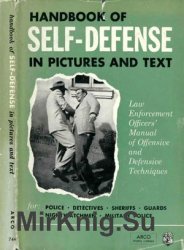Handbook Of Self-Defense in Pictures and Text
- Добавил: Materialist
- Дата: 27-04-2019, 12:42
- Комментариев: 0
 Название: Handbook Of Self-Defense in Pictures and Text
Название: Handbook Of Self-Defense in Pictures and TextАвтор: John Martone
Издательство: Arco Publishing Company
Год: 1962
Формат: pdf
Страниц: 111
Для сайта: litmy.ru
Размер: 118.43 MB
Язык: английский
Law Enforcement Officers' Manual of Offensive and Defensive Techniques.
One of the lesser-known of the "practical, real world combat" greats! Martone certainly knew his business, and the practical realism and functionality of the material described in this excellent little book makes it a "must acquire" item for the professional combatives teacher and the serious student, alike!
Martone’s book, although long out of print, is well worth searching for. In it he explains very clearly the factors needed for success in hand-to-hand combat, and then proceeds to explain the basis of what anyone aspiring to practical proficiency needs to know. Getting and staying in shape. How to stand and move. (Martone teaches a basic fighting stance, which is good, of you must take a stance, but — like Applegate’s stance in Kill Or Get Killed, is largely superfluous for self-defense. Why get into a stance that betrays a readiness to do battle? Better a relaxed-but-ready stance that prepares you but that does not betray the fact that you are ready for action). What is good about the stance material is the footwork. Having been a boxer (and one of Jack Dempsey’s sparring partners), Martone bases all footwork on the Western boxer’s model — which we do, similarly, in American Combato — and which makes a thousand times the sense that all of the elaborate and exotic stance work drills and movements make, that are taught in most of the classical/traditional martial arts.
Most welcome is Martone’s simplified way of describing the body’s vital points. Instead of enumerating dozens of vital targets (of which, when put to the test of real combat, are hardly all that reliable, at all) Martone reduces his advocacy to a few core targets — and those he describe make sense. We have always agreed with Rex Applegate on this matter of vital points. The human body has about a dozen or so for the purpose of fast-moving, genuine, dangerously serious hand-to-hand combat. Martone is sensible and worth paying attention to, as is Applegate.
Emphasizing that the open rather than the closed hand is the better weapon for serious combat (something, we hope the reader will note, is coming from a professionally qualified boxer. Jack Dempsey, when training Coast Guardsmen in close combat, along with his colleague, Bernard Cosneck, the wrestler, stressed this fact, too) the first blow urged by him is the edge-of-the-hand blow. Martone does not emphasize the thumb up position taught by Fairbairn and Applegate for the edge-of-the-hand blow, but illustrates a version closer to that utilized by Brown and Begala who developed and taught the U.S. Naval Aviation Cadet’s Course in hand-to-hand combat, during WWII. John Martone also describes the fingertips thrust to the solar plexus (a blow that we were trained in also, by a former FBI Instructor who had learned the blow from Fairbairn during WWII). We personally do not care for this blow, but we have no doubt about its efficacy when properly rendered — particularly against an adversary wearing light outer clothing — and for those who like it, go for it.
More good, simple stuff follows throughout the book. Ramming fingers into the eyes, using the fingers to apply a pincher-grip to the windpipe, and employing a seizure-and-crushing action with the hand in order to attack the testicles. Good, simple, reliable doctrine that WORKS.
We especially like Martone’s advocating — and illustrating — open hand claw-ripping to the face. This is somewhat reminiscent of Fairbairn’s excellent Tiger’s Claw attack, and this is the kind of material that is needed when the you-know-what hits the fan! Forget all of the pretty and acrobatic stuff! Thank goodness John Martone has forgotten and completely discarded all of the fluff in this book!
There are some good, simple reactive defense actions described, and the counter weapon skills are very good. Very similar to Applegate’s.
Martone provides some superb guidelines for police officers — similar to the material that we advocate for our students who work in law enforcement. We note — appreciatively! — that Martone’s advice would in some instances be regarded with raised eyebrows in today’s major urban police academies. For example, Martone advises: Never give an adversary a break in any fight. Amen. Doubtless, the tone of that (as a lawyer might say) conveys a bit too much aggressiveness for the modern, sensitive public. (Would that members of the public were more sensitive to the horrific dangers that police face when engaging felons in hand-to-hand battle!).
We would have liked to have seen a bit more emphasis on kicking in this book — most specifically the side stomping type kick.
On balance we’d rate this book as being among the top 50 all time great texts that have been written in English on the subject of self-defense and close combat.
[related-news] [/related-news]
Внимание
Уважаемый посетитель, Вы зашли на сайт как незарегистрированный пользователь.
Мы рекомендуем Вам зарегистрироваться либо войти на сайт под своим именем.
Уважаемый посетитель, Вы зашли на сайт как незарегистрированный пользователь.
Мы рекомендуем Вам зарегистрироваться либо войти на сайт под своим именем.
